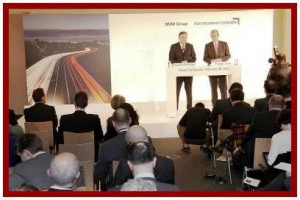
Hybrids offer fuel economy improvements without the range anxiety that pure electric vehicles induce.
The BMW Group and PSA Peugeot Citroën will invest €100 million in a joint venture that will develop hybrid technologies it was announced today at the Geneva Motor Show.
The newly formed company will operate out of two locations – the greater Munich area, home of BMW, and Mulhouse, France, long a Peugeot factory town. About 400 employees are expected to work for the joint venture by the end of 2011, but only 100 new jobs will be created as the European market enters its fourth straight year of declining sales.
Component parts will be used in various BMW and PSA vehicles starting in 2014. Toyota, of course, is the global leader in hybrid technology that was once dismissed by European, U.S. and other Japanese automakers as not promising. The new JV will focus on battery packs, generators, power electronics, chargers, and software for hybrid systems.
“As responsible carmakers, we aim to create an open European platform and foster the development of European standards for hybrid technologies,” said Philippe Varin, Chairman of the Managing Board of PSA Peugeot Citroën at a press conference at the show, which was largely overshadowed by rising oil prices due to the ongoing political turmoil in the Mideast and North Africa, home to increasingly challenged repressive governments and much of the world’s proven oil reserves.
“The joint venture will enable us to act more strategically and with a single, shared approach. For us, joining forces also means significant economies of scale, shared development costs, using standardized components and a faster development process,” said Norbert Reithofer, Chairman of the Board of Management of BMW AG.
Munich will be the location for all research and development, while all production would take place in Mulhouse, France. The 400 employees now in the process of being hired will be based in Munich. Additional jobs in Mulhouse will be added in time for the start of production in 2014, with the French factory ultimately employing about 250 employees.
BMW Group and PSA Peugeot Citroën have almost ten years of working together. In 2002, both agreed to use a jointly designed 4-cylinder engines. Between 2006 and 2010, more than 1.8 million motors were built for MINI, Peugeot and Citroën brand models. In February 2010, the two companies also agreed to develop the next generation of their jointly designed 4-cylinder gasoline engine.
In October 2010, BMW Group and PSA Peugeot Citroën signed a Memorandum of Understanding covering hybrid systems. On February 2, 2011, BMW Group and PSA Peugeot Citroën announced that this cooperation would take the form of a joint venture named “BMW Peugeot Citroën Electrification.”

